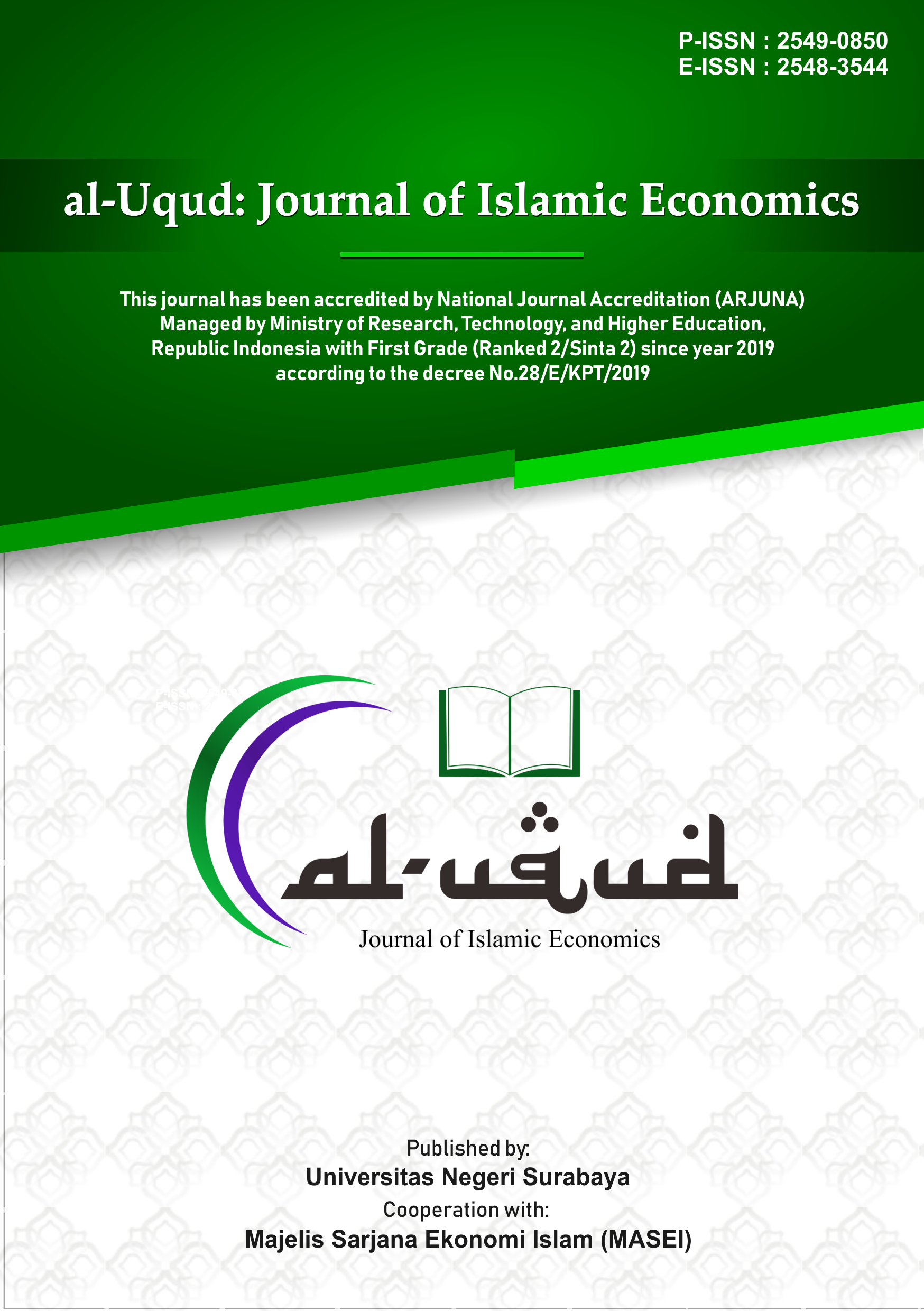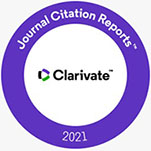Cash Waqf for Developing Islamic Economy: Case Study in Indonesia
DOI:
https://doi.org/10.26740/al-uqud.v5n1.p43-59Keywords:
Cash Waqf, Indonesia, IFE-EFE MatrixAbstract
This study attempts to identify the causes and dominant factors that hinder the development of cash waqf in Indonesia, using the IFE-EFE Matrix and SWOT methods, while offering solutions to solve it. Based on the results of IFE analysis, the highest-rank of strengths is the ability of cash waqf in expanding the base of waqf fund sources followed by the ease and zero cost of funds. In comparison, the top weaknesses are the lack of socialisation to the community and the lack of professional nazhir human resources. The results of EFE analysis imply the highest-rank opportunity is the potential of unlimited cash waqf followed by the emergence of many sharia financial institutions and Islamic economics study programs in universities. Meanwhile, the top threat is a weak political will of authorities, followed by the majority of traditional nazhir. It is expected that there will be a joint commitment from various parties, both from policymakers and academics and practitioners to support and encourage efforts to develop the Islamic (social) finance industry, especially in developing cash waqf in Indonesia.
References
Alias, N., Rozali, E., & Sidek, R. (2015). The history of waqf fund development at hospital Fatih, Istanbul (1470-1481M). Proceedings of The 6th International Symposium.
Atan, N. A., & Johari, F. (2017). A Review on Literature of Waqf for Poverty Alleviation Between 2006-2016. Library Philosophy and Practice (e-Journal). https://digitalcommons.unl.edu/libphilprac/1486
Ayedh, A., Echchabi, A., & Ihsan, H. (2018). Waqf accountability in the Republic of Yemen: An empirical analysis. QIJIS (Qudus International Journal of Islamic Studies), 6(2), 161180. https://doi.org/10.21043/qijis.v6i2.4030
Aziz, M. R. A., Yusof, M. A., Johari, F., Ramli, A., & Sabri, H. (2014). The Relief of Higher Education Loan through Islamic Waqf Bank. Asian Social Science, 10(22). https://doi.org/10.5539/ass.v10n22p175
Bahroni, I. (2012). Streamlining Education Institution Through Waqf Enlargement: An Experience of Gontor System. In At-Ta'dib (Vol. 7, Issue 2). https://doi.org/10.21111/AT-TADIB.V7I2.79
Baqutayan, S., Mohsin, M., Mahdzir, A., & Ariffi, A. (2018). The psychology of giving behaviour in Islam. Sociology International Journal. https://doi.org/10.15406/sij.2018.02.00037
Budiman, A. A. (2011). AKUNTABILITAS LEMBAGA PENGELOLA WAKAF. Walisongo: Jurnal Penelitian Sosial Keagamaan, 19(1), 75. https://doi.org/10.21580/ws.19.1.213
Daud, D., Rahman, R. A., & Sulaiman, Z. (2011). Waqf reporting to fulfil stakeholder attribution in Waqf Islamic councils. Business and Management Quarterly Review, 2(1).
Devi, A., & Rusydiana, A. S. (2016). Islamic Group Lending Model (Glm) and Financial Inclusion. International Journal of Islamic Business Ethics, 1(1), 80. https://doi.org/10.30659/ijibe.1.1.80-94
Fajariah, A. P., Sudana, S., & Rusydiana, A. S. (2020). Wakaf Uang untuk Optimalisasi Pembiayaan Usaha Mikro Kecil dan Menengah (Umkm) Melalui Koperasi Syariah di Indonesia. Jurnal Manajemen Teori Dan Terapan, 13(1), 115. https://doi.org/10.21684/2411-7978-2016-2-2-105-120
Furqon, A. (2011). Analisis Praktek Perwakafan Uang pada Lembaga Keuangan Syariah. Walisongo: Jurnal Penelitian Sosial Keagamaan, 19(1), 157. https://doi.org/10.21580/ws.19.1.216
Habibi, M. L., & Yudha, A. T. R. C. (2017). Membangun Integrated Takaful dan Wakaf Model Pemegang Polis. Al-Uqud: Journal of Islamic Economics, 1(July), 139155. https://doi.org/10.26740/jie.v1n2.p139-155
Hamber, N. M., & Haneef, M. A. (2017). Waqf-based social micro venture fund: A proposal for the Malay-Muslim community in Singapore. Journal of King Abdulaziz University, Islamic Economics, 30(1), 3760. https://doi.org/10.4197/Islec.30-1.3
Haneef, M. A. (2018). Waqf as a socio-economic institution. Journal of King Abdulaziz University, Islamic Economics, 31(2), 7178. https://doi.org/10.4197/Islec.31-2.5
Harun, F. M., Possumah, B. T., Shafiai, M. H. B. M., & Nor, A. H. M. (2016). Issues and Economic Role of Waqf in Higher Education Institution: Malaysian Experience. Al-Iqtishad: Journal of Islamic Economics, 8(1), 149168. https://doi.org/10.15408/aiq.v8i1.2514
Hasan, R., Siraj, S. A., & Mohamad, M. H. S. (2017). Antecedents and Outcome of Waqif's Trust in Waqf Institution. Journal of Economic Cooperation and Development, 4(38), 155180.
Hasan, Z. A., Othman, A., Ibrahim, K., Shah, M. A. M. M., & Noor, A. H. M. (2015). Management of Waqf Assets in Malaysia. International Journal of Nusantara Islam, 1(2), 5968. https://doi.org/10.15575/ijni.v3i1.412
Hasbullah, H. (2012). Dinamika Pengelolaan Wakaf Uang¯: Studi Sosio-Legal Perilaku Pengelolaan Wakaf Uang Pasca Pemberlakuan UU No. 41 Tahun 2004 Tentang Wakaf. https://doi.org/10.18326/ijtihad.v12i2.123-143
Hassan, N., Rahman, A. A.-, & Yazid, Z. (2018). Developing a New Framework of Waqf Management. International Journal of Academic Research in Business and Social Sciences, 8(2), 287305. https://doi.org/10.6007/ijarbss/v8-i2/3872
Haura, A., Baga, L., & Tanjung, H. (2015). Analisis pengelolaan wakaf uang pada koperasi jasa keuangan syariah (pendekatan analytical network process). Al-Muzara'ah. https://doi.org/10.29244/jam.3.2.89-105
Himam, N. S., & Umam, K. (2018). Modelling Sukuk Waqf For Pesantren Economic development. Journal of Islamic Economics and Philanthropy (JIEP), 1(3), 123. https://doi.org/http://dx.doi.org/10.21111/jiep.v1i3.2556
Hossain, B. (2019). Islamic Microfinance and Rehabilitation Model for the Slum and Floating Population by Waqf Funds, the Case of Bangladesh: A Proposal for Muslim Countries. JKAU: Islamic Econ., 32(2), 139160. https://doi.org/10.4197/Islec
Ihsan, H., Sulaiman, M., Alwi, N. M., & Adnan, M. A. (2017). A study of accountability practice in Dompet Dhuafa Waqf of Indonesia. Journal of King Abdulaziz University, Islamic Economics, 30(2), 1332. https://doi.org/10.4197/Islec.30-2.2
Kachkar, O. A. (2017). Towards the establishment of cash waqf microfinance fund for refugees. ISRA International Journal of Islamic Finance, 9(1), 8186. https://doi.org/10.1108/IJIF-07-2017-007
Khan, T. (2019). Venture waqf in a circular economy. ISRA International Journal of Islamic Finance, 11(2), 187205. https://doi.org/10.1108/IJIF-12-2018-0138
Laallam, A., Kassim, S., Ali, E. R. A. E., & Saiti, B. (2020). Intellectual capital in non-profit organisations: lessons learnt for waqf institutions. ISRA International Journal of Islamic Finance, ahead-of-p(ahead-of-print). https://doi.org/10.1108/ijif-10-2018-0111
Masruki, R., & Shafii, Z. (2013). The Development of Waqf Accounting in Enhancing Accountability. Contemporary Islamic Finance and Wealth Management, 13, 106. https://doi.org/10.5829/idosi.mejsr.2013.13.1873
Mikail, S. A., Ahmad, M. A. J., & Adekunle, S. S. (2017). Utilisation of zakÄh and waqf fund in micro-takÄful models in Malaysia: an exploratory study. ISRA International Journal of Islamic Finance, 9(1), 100105. https://doi.org/10.1108/IJIF-07-2017-010
Mohsin, M. I. A. (2013). Financing through cash-waqf: a revitalisation to finance different needs. International Journal of Islamic and Middle Eastern Finance and Management, 6(4), 304321. https://doi.org/10.1108/IMEFM-08-2013-0094
Musa, S. O., & Salleh, M. C. M. (2018). Proposing a Model for Entrepreneurship Development: the Role of Entrepreneurs' Cash Waqf Intention. Journal of Islamic Monetary Economics and Finance, 4(1), 183204. https://doi.org/10.21098/jimf.v4i1.764
Nizar, A. (2014). Faktor-Faktor yang Mempengaruhi Persepsi Wakif Tentang Wakaf Uang. Esensi: Jurnal Bisnis Dan Manajemen, 4(1). https://doi.org/10.15408/ess.v4i1.1953
Nugroho, T., Rusydiana, A. S., & Tubastuvi, N. (2018). Micro and Small Enterprises Financing Model Through The Revolving Fund Management Institution in Indonesia¯: AHP Approach. International Jurnal of Islamic Business Ethics (IJIBE), 3(2), 496504. https://doi.org/10.30659/ijibe.3.2.496-504
Nurfalah, I., & Rusydiana, A. S. (2018). Early Warning to Banking Crises in the Dual Financial System in Indonesia: The Markov Switching Approach. JKAU: Islamic Econ., 31(2), 133156. https://doi.org/10.4197/Islec. 31-2.10
Oktarina, A., & Asnaini. (2018). Developing models of productive Waqf Masjid Agung Syuhada Yogyakarta. QIJIS (Qudus International Journal of Islamic Studies), 6(1), 103126. https://doi.org/10.21043/qijis.v6i1.3719
Permaisela, D. (2019). Analysis of Productive Waqf Practice and Management: Using Swot Analysis Method. Al-Uqud¯: Journal of Islamic Economics, 3(1), 85. https://doi.org/10.26740/al-uqud.v3n1.p85-97
Pitchay, A. A., Meera, A. K. M., & Saleem, M. Y. (2014). Priority of Waqf Development Among Malaysian Cash Waqf Donors¯: An AHP Approach. Journal of Islamic Finance, 3(1), 1322. https://doi.org/10.12816/0031475
Pitchay, A. A., Meera, A. K. M., & Saleem, M. Y. (2015). Factors influencing the behavioral intentions of Muslim employees to contribute to cash-waqf through salary deductions. JKAU: Islamic Econ., 28(1), 63100. https://doi.org/10.4197/Islec.28-1.3
Pitchay, A. A., Thaker, M. A. M. T., Mydin, A. A., Azhar, Z., & Latiff, A. R. A. (2018). Cooperative-waqf model: a proposal to develop idle waqf lands in Malaysia. ISRA International Journal of Islamic Finance, 10(2), 225236. https://doi.org/10.1108/IJIF-07-2017-0012
Ramli, A., Fahmi, F., Darus, F., & Ismail, N. (2018). Primary Drivers of Sustainable Performance: The Case of Corporate Waqf. Global Journal Al Thaqafah, 8(1), 207218. https://doi.org/10.7187/gjatsi2018-14
Rashid, S. K. (2018). Potential of Waqf in the contemporary world. Journal of King Abdulaziz University, Islamic Economics, 31(2), 5369. https://doi.org/10.4197/Islec.31-2.4
Razak, D. A., Embi, N. A. C., Salleh, M. C. M., & Fakhrunnas, F. (2016). A Study on Sources of Waqf Funds for Higher Education in Selected Countries. ADAM AKADEMÄ°, 6(1), 113128.
Rusydiana, A. S. (2018a). Analysis Of Cash Waqf Development In Indonesia Using Interpretive Structural Modeling (ISM). Journal of Islamic Economics Lariba, 4(1), 124. https://doi.org/10.20885/jielariba.vol4.iss1.art1
Rusydiana, A. S. (2018b). Kriteria Pemilihan Lembaga Wakaf Di Indonesia: Pendekatan Multicriteria Decision Making. Equilibrium: Jurnal Ekonomi Syariah, 6(2), 185. https://doi.org/10.21043/equilibrium.v6i2.3725
Rusydiana, A. S., & Al Farisi, S. (2016). How Far Has Our Wakaf Been Researched? Ekonomi, 15(1), 3142. https://doi.org/10.15408/etk.v15i1.3110
Rusydiana, A. S., & Devi, A. (2018). Elaborating Cash Waqf Development In Indonesia Using Analytic Network Process. International Journal of Islamic Business and Economics, 2(1), 113. https://doi.org/10.28918/ijibec.v2i1.1177
Rusydiana, A. S., & Firmansyah, I. (2018). Strategi Pengembangan Lembaga Keuangan Mikro Syariah di Indonesia: Pendekatan Matriks IFAS EFAS. Jurnal Ekonomi Islam, 9(1), 4674.
Rusydiana, A. S., & Rahayu, S. S. (2019). Bagaimana Strategi Pengembangan Wakaf Tunai Di Indonesia? Jurnal Ekonomi Dan Bisnis Islam (Journal of Islamic Economics and Business), 5(1), 15. https://doi.org/10.20473/jebis.v5i1.10416
Rusydiana, A. S., Sudana, S., & Marlina, L. (2019). Manakah Prioritas Sektor Pengembangan Wakaf Di Indonesia? Al-Masraf¯: Jurnal Lembaga Keuangan Dan Perbankan, 4(1), 7. https://doi.org/10.15548/al-masraf.v4i1.232
Saad, N. M. (2016). Best practices of waqf: Experiences of Malaysia and Saudi Arabia. Journal of Islamic Economics Lariba, 2(2), 5774. https://doi.org/10.20885/jielariba.vol2.iss2.art5
Shaikh, S. A. (2017). Developing an index of socio-economic development consistent with Maqasid al-Shari'ah. Journal of King Abdulaziz University, Islamic Economics, 30(1), 117129. https://doi.org/10.4197/Islec.30-1.11
Shulthoni, M., & Saad, N. M. (2018). Waqf fundraising management: A conceptual comparison between traditional and modern methods in the waqf institutions. Indonesian Journal of Islam and Muslim Societies, 8(1), 5786. https://doi.org/10.18326/ijims.v8i1.57-86
Suhaimi, F. M., Rahman, A. A., & Marican, S. (2014). The role of share waqf in the socio-economic development of the Muslim community: The Malaysian experience. Humanomics, 32(1), 1932. https://doi.org/10.1108/h-12-2012-0025
Sulaiman, S., Hasan, A., Mohd Noor, A., Ismail, M. I., & Noordin, N. H. (2019). Proposed models for unit trust waqf and the parameters for their application. ISRA International Journal of Islamic Finance, 11(1), 6281. https://doi.org/10.1108/IJIF-02-2018-0019
Thaker, M. A. B. M. T., Mohammed, M. O., Duasa, J., & Abdullah, M. A. (2016). Developing cash waqf model as an alternative source of financing for micro-enterprises in Malaysia. Journal of Islamic Accounting and Business Research, 7(4), 254267. https://doi.org/10.1108/JIABR-09-2014-0029
Widiastuti, T., Mawardi, I., Robani, A., & Rusydiana, A. S. (2018). Optimisation of Zakat fund management in regional Zakat institution. Humanities and Social Sciences Reviews, 6(2), 133139. https://doi.org/10.18510/hssr.2018.6217
Widiastuti, T., Rusydiana, A. S., & Firmansyah, I. (2017). Development Strategy For Islamic Microfinance Institution In Indonesia: Ifas-Efas Matrix Approach. 1st International Conference on Islamic Economics, Business and Philanthropy Becomes, Iciebp, 707711. https://doi.org/10.5220/0007088407070711
Winarsih, R., Masrifah, A. R., & Umam, K. (2019). the Integration of Islamic Commercial and Social Economy Through Productive Waqf To Promote Pesantren Welfare. Journal of Islamic Monetary Economics and Finance, 5(2), 321340. https://doi.org/10.21098/jimf.v5i2.1065
Downloads
Published
How to Cite
Issue
Section
License
CC BY 4.0 Abstract views: 2771
,
Abstract views: 2771
, PDF Downloads: 2384
PDF Downloads: 2384








